The Indian chess circuit, in general, is widely considered to be a rating grave. Foreign players coming to India as well as the stronger Indian players are wary of the challenge that lies ahead – loads of underrated players having a keen eye for tactics in addition to their unflinching attitude. With all this is in mind, how about winning two such international opens out of a possible three on the circuit? Massive, right? That is exactly what 29-year-old Ukrainian Grandmaster Adam Tukhaev did – won international opens in Mumbai and Chennai while finishing respectably at Delhi. Post the circuit, we caught up with Adam to know more about how the events transpired. In this interview, catch him speak on his successful Indian tour, his approach to the events, some intriguing experiences, and the chess scene back home – all these in a humble yet humorous fashion.
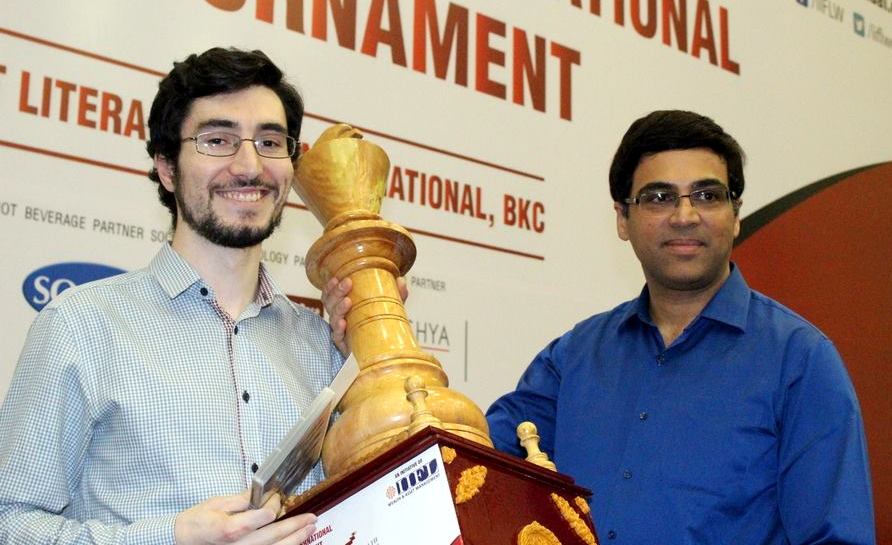
Shubham Kumthekar: Three events on the tour and two victories! Congratulations! What does it feel like?
Adam Tukhaev: Thank you! It felt so abnormal – my mind took some convincing that it really happened. Yeah, it feels good. 🙂
What are your impressions of your play during this circuit?
Well, in Mumbai (2nd IIFL Wealth International), there was nothing really special about my play. I had a mediocre event until I got it handed on a plate in the 7th round when Rajesh blundered in a drawing opposite colored bishops’ endgame, and then again in the final game when Bernadskiy missed a crucial bishop sacrifice on h5. Sure, I was there to use the chances, but it takes a lot of luck to be granted such opportunities!
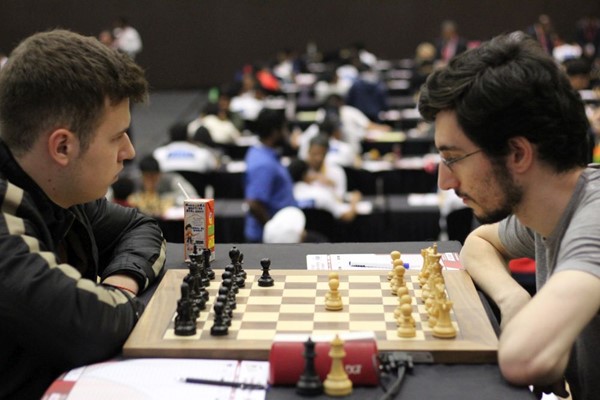
Somehow, I was quite satisfied with my efforts in Delhi (15th Delhi International). I really struggled in the first half but kept fighting, and by the last round managed to get back to the top boards. In the last round, I had some chances against Swayams, but he held on.
And in Chennai (9th Chennai Open), don’t let the result blind you! There were definitely some bumps on the road to a seemingly perfect start. Like, I came completely unprepared for the second game and had to survive some scary moments in the opening. Later, I was completely lost in Round 4 vs Saravana but found my luck in the time trouble. Irrespective of all these, that was my best tournament in terms of my play.
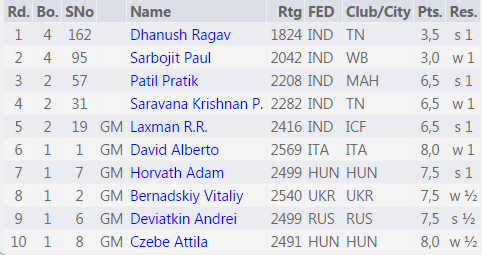
The thing I liked most about my play was the hunger for chess which helped me find some fresh ideas at the board. As is tradition, I was rather underprepared and often didn’t calculate well, but my opponents were really kind and gracious 🙂
While most GMs were struggling, you were pretty consistent. What, according to you, may have made the difference?
Indeed, I didn’t lose a single game out of almost 30 – but that wasn’t for the lack of trying! I think the closest calls were in the games vs Kurbonboeva (Delhi, Round 5), Saravana (Chennai, Round 4) and Deviatkin (Chennai, Round 9). So, first of all, I was simply fortunate. Then again, I didn’t try to push things when I just wasn’t feeling it. Sometimes, I wouldn’t mind a quick draw or play something extra solid just trying not to blunder stuff. I think I managed to find a good balance.
Considering that it was a successful tour, you may have had plenty of good games. Which are your personal favorites?
The game against Horvath (Chennai, Round7) for the nice finish (I mean the line that could’ve happened after 21.Bd3 axb3+ 22.Ba5 Qxd1+!) – and for the very rare opportunity to play against a fellow GM whose name is also Adam! Apart from that, I can’t recall anything bright enough. The last round effort in Mumbai was very important, of course, but the nerves got the better of both of us, so the game’s quality was not particularly high.
Winning an open tournament is considered to be a strikingly different challenge as compared to the traditional all-play-alls. What, in your opinion, are the quintessentials to be a good open player?
Wouldn’t hurt being a good round robin player to start with 🙂 I think that in order to have a chance to win a swiss event, you need to be prepared to take more risks. If you don’t have losing positions in an open tournament, you’re doing it wrong!

Playing three tournaments on the trot, sometimes with two rounds a day, can get tiresome. How do you ensure staying in the best physical shape?
Back at home, I have a fitness coach. Her name is Luna, and she’s a dog! Very cute 2-year-old Saluki. My preferred cardio is just walking around. In Mumbai, I had a company for that as well, but then in Delhi, I got sick (as many other colleagues – there was something in the air!) and hadn’t fully recovered until a few days after the trip! So my strategy for Delhi and Chennai was just to preserve energy – I didn’t go anywhere except to grab something to eat.
What was your approach like during these events?
The routine was nothing special, and the preparation depended on the opponent. If I thought that the appropriate preparation would take too much time, I chose to get some rest instead. And when my opponent’s repertoire was more or less limited, I would try to cook some stuff beforehand. It didn’t always work, but sometimes it was spot on, like against Sunilduth and Swayams in Delhi.
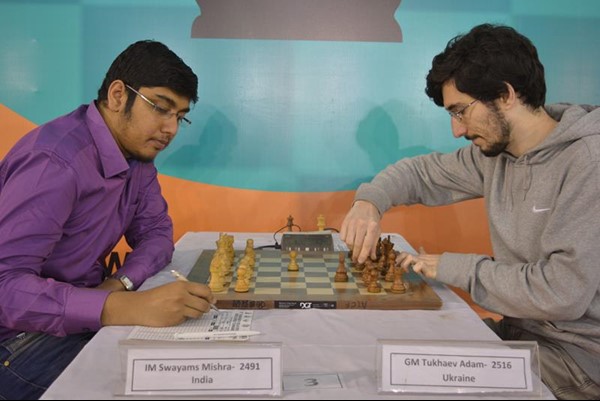
You may have visited quite a few places in Mumbai, Delhi & Chennai during this tour. Can you share some of your interesting experiences as a tourist during this circuit? 🙂
Normally, at tournaments, I turn into a couch potato as I don’t have much time nor the company to explore the surroundings. But in Mumbai, I was lucky enough to meet Nathan Alfred, an English player now doing God’s work in Singapore (he’s a rabbi), and persuaded him to include me in some of his journeys. That’s how I got to see some famous landmarks. I liked the Elephanta island – it was nice to interact with monkeys even though one of them robbed me of a water bottle 🙂 My favorite trip was the one at Global Vipassana Pagoda after the tournament. I felt like it helped clear some negative thoughts and regain calmness.
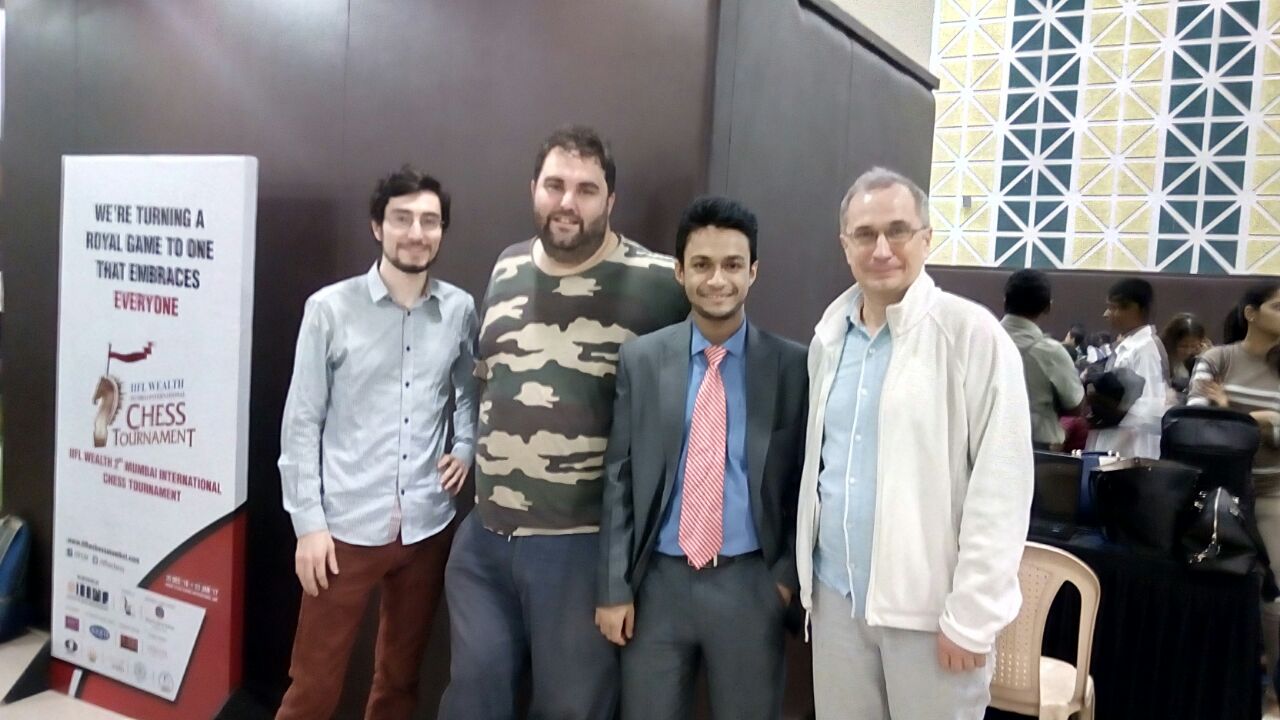
Due to physical conditions, Delhi was a complete hotel – tournament hall – hotel kind of experience. Chennai was mostly like that as well.
But on the rest day caused by the jallikattu ordeal, together with a few other players, we went to the Marina Beach, which was the epicenter of protests! We had to join the crowd for a few minutes, and some guys were even taking pictures with us, trying to teach us how to say ‘jallikattu’ properly. It was fun!
It did take some time to get to the actual beach and then get back home, but it was worth it.
This is your second trip to India. What do you like about playing in India and what do you consider to be the biggest challenges?
Yes, I played Delhi and Chennai last year as well. Well, for one thing, it’s a nice getaway from the winter at home! You know, I kinda like the snow, but when it’s -30 Celsius you can’t help but think that you can die simply being outdoors for too long, and you start to question all the life decisions that led to staying where you are.
Secondly, it’s the food. At home, I mostly cook for my family, and sometimes it gets boring for everyone involved 🙂 Here, it feels like getting a break. It’s delicious, it’s spicy, and there is such variety that you can always find something new.
Then again, I love being immersed into English speaking community. Hindi scripture looks interesting, and I learned some of the letters by reading the names of metro stations, but the language seems too formidable to try and learn even if only the basics. Besides, it won’t help if you are in Chennai 🙂
Last but not the least, people are somewhat friendlier here than I’m used to. Once you learn the vital skill of crossing a busy road, you begin to feel like you are going to be alright!
As for the challenges – by far, the worst thing I’ve experienced in India was the air condition in Delhi. It’s so bad that it’s unbelievable – makes you value more the air at home, though 🙂
Of course, the local players are underrated and you can easily shed a massive amount of Elo points if you’re not careful. And even if you are. But hey, there’s got to be some catch, right?
You hail from Ukraine and are currently staying in Russia. What do you find different about chess in India as compared to Ukraine/Russia?
Chess has been very popular in the USSR, and the countries that were parts of it continue to reap the benefits of the chess culture that had emerged. Whether we’re talking about middlegame and endgame ideas, or take a look at the opening preparation, the players from Ukraine and Russia normally have some advantage on account of being connected to this culture from a very young age.
India is certainly not behind any other country in raw chess talent. The trait Indian players (I mean those below GM level) are mostly known for is, I think, the ability to defend worse positions. Add to that tactical awareness, as well as being underrated, and it’s easy to see why foreign players donate so many Elo points here. Considering the fact that chess is popular and efforts are being made to promote the game and nurture the talent, it’s not hard to predict bright future for the Indian chess team. Bronze medal at Tromso Olympiad 2014 is surely a hint of things to follow.
Let’s take a dive into the past. How did it all begin?
I was five, and my father brought me along to something like a sports center for kids. I think my first choice was some kind of wrestling. But then one day, I looked around and spotted a drawing of a chess knight on one of the doors and asked my dad what it was. And so it started.
Time and again, we hear about the importance of good coaching at the grassroots level. How is the early coaching scene in Ukraine/Russia like? Can you tell us something about some of the most influential coaches you worked with at a young age?
Yeah, Ukraine and Russia are known for their good coaches at every level. I don’t know, I think the best thing a coach can do for a kid that wants to learn chess is not to stifle the natural curiosity. So you have to introduce the important tactical ideas and strategic concepts while helping him or her explore what they like the most about the game. You certainly shouldn’t overdo openings, for one thing. At some moment, of course, you have to start looking into openings more seriously and study closely how they connect to the middlegame and endgame.
I remember fondly the lessons with my first coach, Aleksander Borshchov from Kerch. He’s a very kind and intelligent person and I felt so at home at the chess club that I was completely absorbed by the game. Sometimes we would work beyond any time limit, finishing long after everyone else went home 🙂
After a few years when I was like eight or nine, he told my parents that he had taught me all he could and that I needed to move on. My parents and I moved from Kerch to Simferopol, and I went to study with a few coaches of a relatively higher caliber, but I feel like something was lost along the way as well.
While growing up as an improving chess player, which famous chess personalities had the biggest influence on you?
Honestly, I feel like I’m not strong enough to have this conversation about influences, but as far as I remember, I’ve always been a big fan of Ivanchuk. I was privileged as to get to work with the man himself after we met on ICC one lucky winter day in 2009! The collaboration has had its moments, and we’re still in touch so I’d like to say he remains my biggest influence.
You became a Grandmaster at a young age of 19. What was the journey to the title like?
Well, it wasn’t considered a tender age even back then. Since I got to around 2450, I had been trying to score GM norms in round robin tournaments in Alushta as it was just an hour’s ride from where I lived, and eventually got the three norms in six attempts. As usual, during that period I analyzed my games, worked on openings, solved a lot of different stuff, and even read some books! I remember being particularly impressed by Chess for Zebras by Jonathan Rowson.

What do you consider as the biggest achievement of your chess career so far?
In terms of performance, Kavala 2010 is the best one – 1st place and a 2775 TPR against mostly 2600+ players. But I’ve never had a more successful series of events than this time in India. Add to that getting married and you can say January 2017 was a month to remember.
How do you generally work on your chess?
Actually, I have mostly been busy with commentating for chesspro.ru as well as occasional coaching and didn’t really work on myself lately. Given time, I usually try to refurbish some opening facilities as well as to train myself to calculate better. Often, such work leads to some kind of burnout though, so the timing is really important.
What chess ambitions do you hold for the future?
I have no plans laid out further than March. I will be playing some chess in Sweden (Ed. – Adam is currently playing at Stockholm), and the ambition is just to be able to enjoy the game.
Blitzkrieg
If you had a chance to meet a celebrity of your choice, who would it be?
Hmm… Well, Barack Obama seems to have got a lot of free time on his hands, right? 🙂
A sports quote that you find the most impressive.
“Do I know what product I’m selling? No. Do I know what I’m doing today? No. But I’m here, and I’m gonna give it my best shot.”
Not a sports movie, but Zoolander helped me get through 28 games in a row. Sums up my approach in the tour pretty well 🙂
Early bird or night owl?
Nighty night owl. Morning rounds is a human invention I don’t like one bit.
Blitz, Rapid or Classical?
I think rapid is the one I am most comfortable with, even though it doesn’t necessarily translate to results.
The cuisine of your choice.
If I have to pick just one, Indian, of course 🙂 All those fantastic gravies, man!